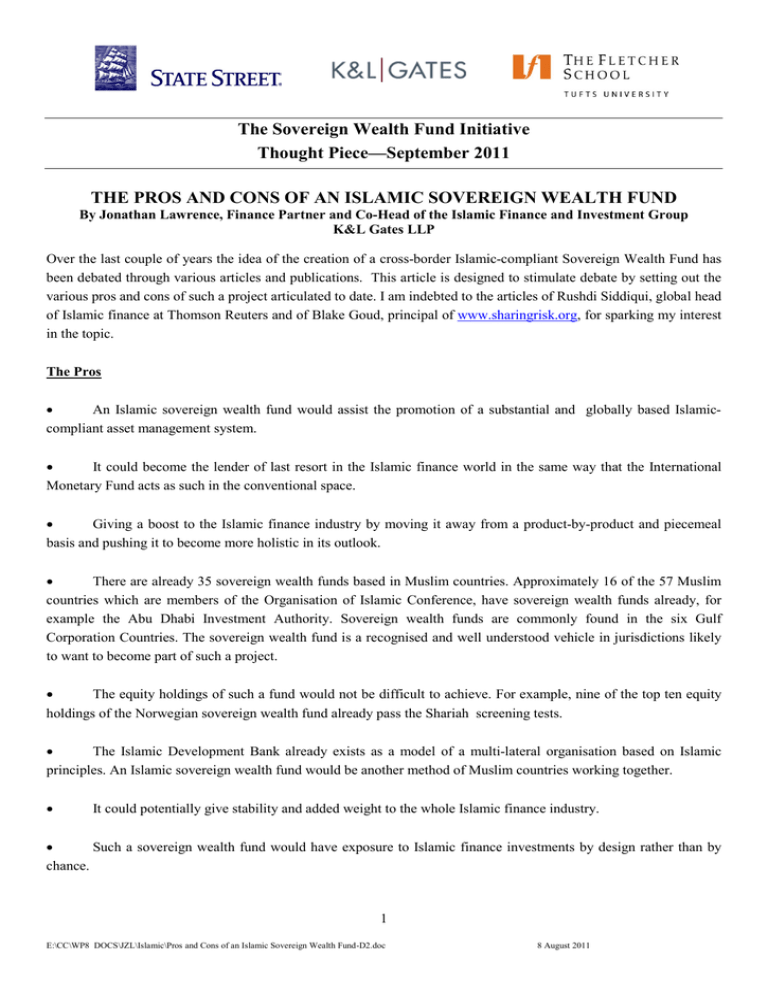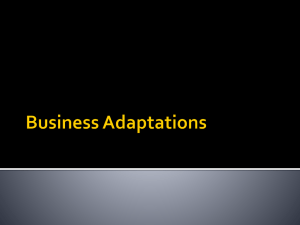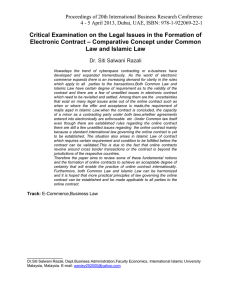The Sovereign Wealth Fund Initiative Thought Piece—September 2011
advertisement

The Sovereign Wealth Fund Initiative Thought Piece—September 2011 THE PROS AND CONS OF AN ISLAMIC SOVEREIGN WEALTH FUND By Jonathan Lawrence, Finance Partner and Co-Head of the Islamic Finance and Investment Group K&L Gates LLP Over the last couple of years the idea of the creation of a cross-border Islamic-compliant Sovereign Wealth Fund has been debated through various articles and publications. This article is designed to stimulate debate by setting out the various pros and cons of such a project articulated to date. I am indebted to the articles of Rushdi Siddiqui, global head of Islamic finance at Thomson Reuters and of Blake Goud, principal of www.sharingrisk.org, for sparking my interest in the topic. The Pros • An Islamic sovereign wealth fund would assist the promotion of a substantial and globally based Islamiccompliant asset management system. • It could become the lender of last resort in the Islamic finance world in the same way that the International Monetary Fund acts as such in the conventional space. • Giving a boost to the Islamic finance industry by moving it away from a product-by-product and piecemeal basis and pushing it to become more holistic in its outlook. • There are already 35 sovereign wealth funds based in Muslim countries. Approximately 16 of the 57 Muslim countries which are members of the Organisation of Islamic Conference, have sovereign wealth funds already, for example the Abu Dhabi Investment Authority. Sovereign wealth funds are commonly found in the six Gulf Corporation Countries. The sovereign wealth fund is a recognised and well understood vehicle in jurisdictions likely to want to become part of such a project. • The equity holdings of such a fund would not be difficult to achieve. For example, nine of the top ten equity holdings of the Norwegian sovereign wealth fund already pass the Shariah screening tests. • The Islamic Development Bank already exists as a model of a multi-lateral organisation based on Islamic principles. An Islamic sovereign wealth fund would be another method of Muslim countries working together. • It could potentially give stability and added weight to the whole Islamic finance industry. • Such a sovereign wealth fund would have exposure to Islamic finance investments by design rather than by chance. 1 E:\CC\WP8 DOCS\JZL\Islamic\Pros and Cons of an Islamic Sovereign Wealth Fund-D2.doc 8 August 2011 • By raising the profile of the Islamic finance industry, it would hopefully have a trickle down effect to the existing financial institutions and organisations active in the area. • It could be based in London, Luxembourg or another non-Muslim country venue in order to provide neutrality. Non-Muslim jurisdictions may compete in order to host the new entity. • An Islamic sovereign wealth fund could be a model by investing in multiple assets, encouraging passive investing and demonstrating good governance methods. The Cons • Some authors have thought it more useful to develop an Islamic compliant mega-bank rather than a sovereign wealth fund. A bank could have a more activist and high profile agenda. Although this would be a rival to the Islamic Development Bank. • There is an underlying tension in the project as such a fund would have to be multi-lateral in nature and would therefore not meet the definition of being "sovereign" in nature. • The asset classes in which such a fund could invest would be limited by the rules of Shariah in comparison to conventional sovereign wealth funds. Therefore it would start off at a disadvantage on the investment playing field. • Such a fund would be under even greater scrutiny and subject to the danger of Islamaphobia, when acquiring strategic stakes in companies across the world. It would be subject to being accused of suspect commercial interests and could be used by politicians to set back the progress of Islamic finance generally. • The International Islamic Liquidity Management Corporation (based in Malaysia and established in 2010) has been set up to be a lender of last resort in the Islamic finance industry and there is an argument that this role is better suited to an entity specifically set up for the purpose. • Such a fund may harm the availability of Sukuk (Islamic compliant bonds) in secondary markets. Traditionally, sovereign wealth funds tend to trade little compared to other funds. Therefore if the new entity bought large amounts of Sukuk then it would do little to encourage other investors. • Political hysteria may lead to a reduction of investment opportunities and therefore to an inward looking investment strategy only into Muslim countries. Political sentiment against sovereign wealth funds is already heightened and do an actively marketed islamic sovereign wealth fund could be hampered from the start. Conclusion My personal view is that an Islamic-compliant sovereign wealth fund is an idea worth pursuing–but would it be more pragmatic to brand the new fund as one which invested on broader ethical principles rather than on a purely Islamiccompliant basis? I would welcome feedback on these issues. 2 E:\CC\WP8 DOCS\JZL\Islamic\Pros and Cons of an Islamic Sovereign Wealth Fund-D2.doc 8 August 2011







